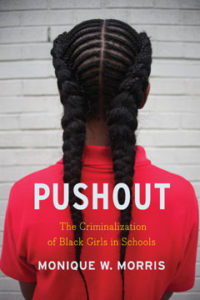Black (Girls’) Lives Matter Too
 The national debate about the criminal justice system has mostly focused on interactions between law enforcement and black males. Michael Brown, Trayvon Martin, Freddie Gray, Eric Garner, Tamir Rice and many others have become the face of unethical black criminalization. While it is important to advocate for black males, let’s not forget black females.
The national debate about the criminal justice system has mostly focused on interactions between law enforcement and black males. Michael Brown, Trayvon Martin, Freddie Gray, Eric Garner, Tamir Rice and many others have become the face of unethical black criminalization. While it is important to advocate for black males, let’s not forget black females.
Recent news stories about black girls include Dajerria Becton, the 15-year-old girl pinned to the ground by a police officer during a pool party last year. I remember the horrific visual of a unarmed, skinny girl in a bikini having a gun put to her head. I also remember the shocking video of the black girl in the South Carolina classroom who was violently ripped out of her desk chair by a security guard.
I recently read Monique W. Morris’ riveting new book, Pushout: The Criminalization of Black Girls in Schools. It makes the case that just like black males, black females have been unfairly judged by society based on long-standing stereotypes about them that go as far back to the days of slavery.
Most of the book focuses on the treatment of black girls in schools. Black girls only make up 16 percent of all girls in American schools, but 42 percent of them get expelled and get corporal punishment, 45 percent get at least one out-of-school suspension, 31 percent are referred to law enforcement, and 34 percent are arrested at school. Black girls who go through this much bad treatment in school will have a harder time as adults.
I really appreciated the interviews with many black girls around the country who have been placed in detention centers because their voices are usually not heard. When you hear their stories, you realize that black girls have very diverse and complex lives and the schools are not taking that into consideration. There was the story of a girl who was raped when she was 12 by a man who forced her into prostitution. She was in and out of foster care homes and wasn’t able to attend school on a regular basis. Missing classes eventually led to her getting suspended many times, fighting with other students and failing school altogether and before going back to prostitution.
To be clear: I am not defending bad behavior on the part of black girls in the classroom, but there are some deeper, multifaceted issues going here that are not being properly addressed, such as their troubled homes, dysfunctional schools, mental health issues, bad role models (reality TV anyone) etc. This is just not simply a black or white (no pun intended) situation.
What is most upsetting, however, was that most of these girls got in trouble for non-disruptive activities, including how they dress, wearing natural hairstyles, or perceived to be acting “unfeminine,” “aggressive,” “loud,” and even “ghetto.” Even as adults, many black women like myself continue to fight the stereotype of being an “angry black woman.”
I have been in many situations in both my academic and professional lives where I felt that I was unfairly treated by my white counterparts, but I always felt like I had to react in a calculated way so as to not get labeled “angry.” I have also been in situations where I was perceived to be engaging in negative activity based on stereotypes. Although I have never been physically assaulted by law enforcement, I have personally seen how these bad stereotypes can manifest in the workplace and other situations that can be detrimental for black women. Some people don’t realize the mental acrobats many black females go through in our daily lives to not just be seen as stereotypes, especially when the consequences can mean being criminalized.
What I really liked about the book was that it gave possible solutions to the black girl push-out phenomenon, by providing resources that students, parents and educators can use to end this crisis in our schools and possibly life in general. If these issues are not addressed appropriately, black girls will continue to be set up to fail.